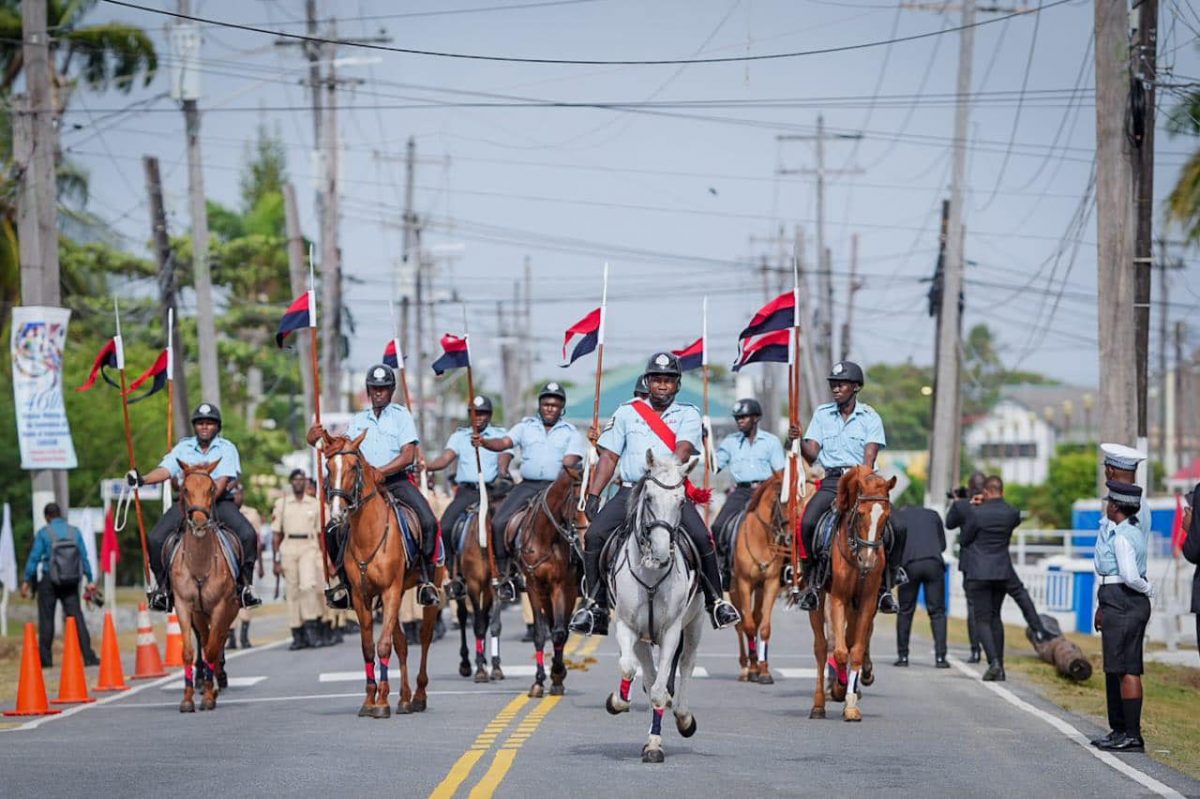Opening the annual officers’ conference yesterday, President Irfaan Ali said that Guyana is in the final stages of having an internationally accredited police academy as he stressed the importance of having a professional force.
According to the President, the greatest expansion of training for members of the police force occurred last year. He said, “We had a tremendous transition of persons now having first degrees, diplomas, masters, PhDs, pursuing law so we are in a situation where I believe that in the next four or five years we will have a highly trained, competent and qualified police force and this is an important part of the transition.”
Importantly, Ali said that the Guyana Police Force was tasked with “integrating what we are doing with the regional policing and to deepen our partnership at the regional level”, adding that they are proud of expanding their relationship to the extent that the country is in the last stage of having an internationally accredited police academy.
He stated, “This is one of the things that we wanted to achieve, build infrastructure here, build systems here that are of international standards because we believe this is how we can share our prosperity with the rest of the region.”
As such he noted that they are also now “integrally integrated in the RSS (Regional Security System), we are providing leadership in many regional institutions and we are also working with extra-regional partners, and I will say that the last year we have also expanded tremendously our partnership with the United States, with India, with the UK.”
He added that there are ongoing collaborations and cooperation with agencies from those countries.
Turning to the ongoing training of prosecutors, Ali said that it is to upskill prosecutors not only with the “competency but with the type of in-classroom and technical expertise that is required in the execution of their duties.”
He then further stressed that it is extremely important that a highly professional police force is built, “so that any citizen can go to bed, sleep well that there are institutions in our country that will not falter and disappoint the people of this country.”
“In doing so the police force must be so professional that safeguarding democracy and the rule of law is natural, it’s not based on influence, but it’s natural, it becomes an inherent character, an inherent character of who you are when you put on a uniform”, he told those gathered.
He said, that once the uniform is placed on them that individual must not hide from their duty when the country needs them to defend its democracy, the rule of law, and upholding the country’s constitutional requirement, “we must not hide from this responsibility.”
According to him, they have also been able to work on improving the total welfare package for the men and women in uniforms with still a lot of work to be done which is continuing.
“I want to assure you that by the time we get to 2027, there is a misconception about the resource inflow, the magnitude of resources that will come into the revenue base of our country will have the greater effect in 2027 and onward, and by then I believe that our workers across this country, our men and women in uniform, our teachers, our doctors, our nurses will be in a position that will see Guyana as an attractive destination for human resource deployment.
“I am not at all bothered about the path to getting there, I am very convinced that that path is well established and we are doing everything within the budgetary framework to advance ourselves on that path”, he said.
Tech policing
Ali then turned to tech policing which he said is about technology and engagement given that even with the best of technologies human engagement is still very much required. “We are working tremendously hard on building the human connectivity led from the front by the Commissioner with the communities and with the Guyana Police Force, so engagement – technology, engagement – communities, that is also an important part of where we are positioning the Guyana Police Force.”
He stressed that it’s not only community policing alone but rather “community security” which is having communities integrated in the ownership of their own security, “having community integrated in the building of their own security for those communities.”
Pointing out that the government is investing in infrastructure, building safe spaces, recreational facilities, and parks for families, Ali said, “So what constitutes community is much more than the old thinking of community policing, this community I am talking about is building how the Guyana Police Force integrates itself in building sustainable communities where we support and foster family development, networking within the communities, the building of relationships within the communities, and how do we use the community as a tool to instill values, instill discipline and instill a community ownership approach to building wealth, to building wealth and to support each other.”
According to him, citizens are to expect “modern outposts in each community” with outposts being heavily technologically advanced “so you will see a lot of technology within these outposts and with quick response assets.”
“We are building out these smaller, more agile units to respond faster, to integrate greater, and to build relationships within the community, so the structure will change and you will see more efficient, faster, agile units”, he stressed.
Meanwhile, President Ali also said that the development within the Guyana Police Force in the last year is something to be proud of, “its human resource development, the performance improvement, the improvement in productivity and the improvement in results, save and except, the situational role that we must deal with and we have to work in a comprehensive way with all stakeholders in finding and bringing innovative approaches that will deal with the fundamental problem that is the way people think and behave and act on the road.”
Ali said that it is unfortunate that innovative ways of enforcement of the law have to be developed “when it is within the power of all of us, within the power of every driver, every road user to act and behave in a manner that is befitting of what is expected of them on the roadways …”
Noting further the rapid development in the country, Ali said that when you look at the size of “our fiscal implementation space, look at the size of the budget for every agency, you will understand that the system, our institutional systems were never built to support this magnitude of expansion and growth.”
Ali said that luckily now there is technology available that provides the opportunity to effectively bridge that gap in a shortened time frame, “for sure we do not have the human resource assets now to deploy in the scale that is required in many sectors, engineering, security, construction.”
Additionally, the President said that the human value of appreciation must be noted too, pointing out that in some cases there are “good police” officers who would have worked thirty years and retired as a constable since the system is designed in such a way “there are numbers and ratios that you have to fulfill in terms of senior command, to constable, to sergeant and all of these things.”
The President then stressed that an approach must be developed where the human assets “feel appreciated and feel counted for after thirty years of service, after ten years of service, after fifteen years of service.”
“And that is important for future transition also so that is something we are looking at, we must look at”, he said.








